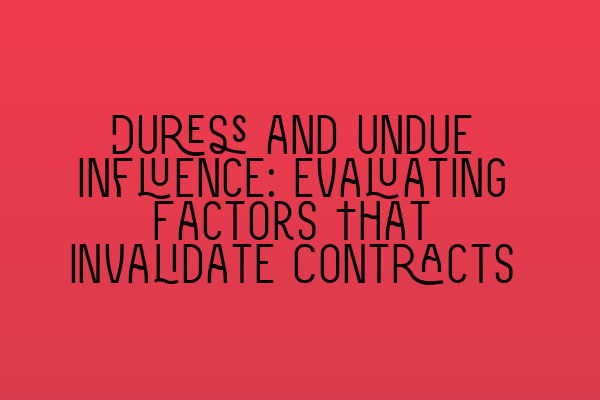Title: Duress and Undue Influence: Evaluating Factors That Invalidate Contracts
Introduction:
In contract law, the fundamental principle is that parties enter into agreements voluntarily and with free will. However, there are circumstances where a contract may be deemed invalid due to the presence of duress or undue influence. In this article, we will explore the factors that invalidate contracts, understand the concepts of duress and undue influence, and analyze their legal implications.
Understanding Duress:
Duress occurs when one party is forced or coerced into entering a contract against their will. This undue pressure undermines the voluntary nature of the agreement and renders it voidable. Different forms of duress include physical threats, economic pressure, psychological manipulation, and blackmail.
To comprehend duress further, it is essential to evaluate the following factors:
1. Nature and severity of the threat
2. Timing and duration of the threat
3. Presence of alternative options
4. Vulnerability of the victim
5. Consequences of non-compliance
Undue Influence Explained:
Undue influence arises when one party takes advantage of their dominant position or relationship to exploit the other party’s weaknesses and influence their decision-making. This manipulation can be intentional or unintentional, rendering the contract voidable.
To better grasp undue influence, it is necessary to consider the following factors:
1. Parties’ relationship dynamics
2. Susceptibility of the victim to influence
3. Inequality of bargaining power
4. Financial or emotional dependency
5. Lack of independent legal advice
Cases where Duress and Undue Influence Invalidate Contracts:
1. A business owner, under threat of physical harm by a competitor, is coerced into signing an agreement selling their business at an unfavorable price. The contract may be invalidated due to duress.
2. An elderly person, heavily reliant on their caretaker, is manipulated into changing their will, leaving a significant portion of their estate to the caretaker. In this situation, undue influence may render the contract void.
Key Takeaways:
1. Contracts entered into under duress or undue influence are considered voidable, allowing the victimized party to seek remedies.
2. The determination of duress and undue influence involves an analysis of various factors that affect the voluntariness of the agreement.
3. Seeking legal advice early on can help identify instances of duress or undue influence and protect vulnerable parties from entering invalid contracts.
Conclusion:
Duress and undue influence serve as essential concepts in contract law, ensuring the integrity of voluntary agreements. By understanding the factors that invalidate contracts based on these grounds, parties can safeguard their rights and interests. If you would like to explore further topics related to contract law, check out our articles on interpreting contractual clauses, understanding different types of agreements, the significance of consideration, simplifying complex concepts, and the discharge of contracts.
Related Articles:
– Interpreting Contractual Clauses: Unlocking the Hidden Meanings
– Agreements in Contract Law: Understanding Its Various Types
– Essentials of Consideration: Understanding the Basis of Contractual Exchange
– Contract Law Tutorials: Simplifying Complex Concepts for Students
– Discharge of Contracts: Modes and Consequences Explained
